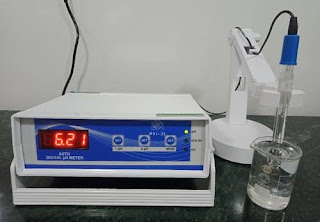Determination of pH

Introduction to pH
pH is a term that you may have come across in various contexts, from science classrooms to skincare products. But what exactly does it mean, and why is it so important? In this article, we will delve into the world of pH, discussing what it is, how it is measured, its significance in different fields, and much more.
What is pH?
pH stands for “potential of hydrogen.” It is a measure of the acidity or alkalinity of a solution. In simpler terms, pH indicates how basic or acidic a substance is. The pH scale ranges from 0 to 14, with 7 being considered neutral. Values less than 7 are acidic, while values greater than 7 are alkaline.
The Importance of pH
Understanding pH is crucial because it has a profound impact on various aspects of our daily lives. From maintaining the health of your body to controlling chemical reactions and environmental conservation, pH plays a significant role.
Determination of pH
Equipment: pH meter
Reagent: Standard pH buffer solutions (pH 4.0 , 7.0 , 9.2)
Procedure: Standardise the pH meter with standard pH buffer solutions of pH closer to the expected pH value of the sample at 250C± 20C.
Immerse the electrode in the solution being examined maintained at 250C± 20C.
Shake the contents foe about one minute and note the constant reading.
Factors Affecting pH
Various factors can influence the pH of a solution or substance:
- Temperature: pH can change with temperature; some reactions are sensitive to temperature changes.
- Concentration: Highly concentrated solutions can have different pH levels than dilute solutions.
- Presence of Other Substances: The addition of acidic or alkaline substances can alter pH.
How to Control pH
Controlling pH is crucial in many industries, including pharmaceuticals:
- Buffer Systems: Pharmaceutical formulations often use buffer systems to maintain a stable pH.
- pH Adjusting Agents: Acids or bases are added to adjust pH as needed.
- pH Meters: Continuous monitoring with pH meters helps maintain precise control.
Common Applications of Determination of pH in Pharmaceuticals
In pharmaceuticals, pH determination is vital for:
- Drug Formulation: Ensuring drugs are in the correct pH range for stability and efficacy.
- Biological Compatibility: Verifying that pharmaceutical products are safe for the body’s pH.
- Quality Control: Monitoring pH during drug manufacturing to maintain product quality.
Determination of pH FAQs
- What does pH stand for? pH stands for “potential of hydrogen.”
- Why is pH important in the human body? pH regulation is crucial for enzymatic reactions and overall bodily function.
- How is pH measured in laboratories? pH can be measured using pH indicators or pH meters, depending on the required precision.
- What is the neutral pH value on the pH scale? The neutral pH value is 7 on the pH scale.
- How can pH affect crop growth in agriculture? pH levels in soil can impact nutrient availability and affect crop health.
Also, Visit:
B. Pharma Notes | B. Pharma Notes | Study material Bachelor of Pharmacy pdf
